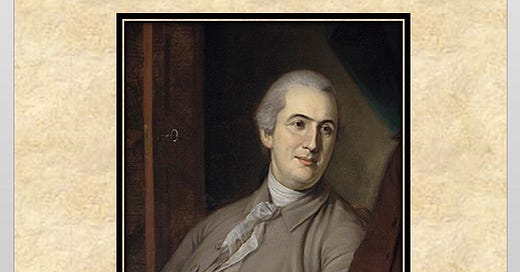TDIH: Gouverneur Morris, author of the Constitution’s Preamble
The Founders wanted to be self-governing, but they also wanted their new government to contain checks against the dangers of mob rule.
On this day in 1752, Gouverneur Morris, author of the Constitution’s Preamble, is born in New York.
Morris was well-educated, witty, blunt, and articulate. He was a soldier, a statesman, a member of the Continental Congress, and a delegate to the Constitutional Convention. (He was a delegate from Pennsylvania, where he then lived, despite being from New York.)
He gave more speeches than any other member of the Constitutional Convention. According to the National Archives, he made 173 speeches on the Convention floor. When the Convention was coming to a close, he was appointed to a Committee of Style that translated the Convention’s conclusions into the Constitution itself. It was at this point that Morris drafted that document’s Preamble.
Morris came from a wealthy family and is sometimes charged with being an aristocrat. A few statements that he made in his ever-blunt style did not help him. For instance, at the Convention he stated: “Give the votes to people who have no property, and they will sell them to the rich who will be able to buy them.” He also argued against the concept of a pure democracy, noting that “Every man of observation had seen in the democratic branches of the State Legislatures, precipitation—in Congress changeableness, in every department excesses [against] personal liberty private property & personal safety.”
But charges of aristocracy misunderstand Morris—and, really, much of the founding generation. The Founders wanted to be self-governing, but they also wanted their new government to contain checks against the dangers of mob rule. They knew that, historically, pure democracies tend to implode because bare majorities can too easily impose their will on others, even when they do so based on a whim or in the heat of an emotional moment.
William Howard Adams, one of Morris’s biographers, offers additional color on Morris’s views. Adams describes Morris as a man who “foresaw the difficulty of establishing and maintaining an effective authority over any large and volatile territory like America . . . . Political tyranny came under many guises, slogans, and labels not limited to the tyranny of kings but could lurk even in democratic republics and the majority will. Without a carefully crafted constitutional framework, the alternative would be a raw, out-of-control power orchestrated by devious politicians ready to destroy all human rights in the name of liberty.”
And Morris was definitely a believer in freedom, as evidenced by his arguments against slavery while at the Convention. He described it as a “nefarious institution” and a “curse of heaven on the States where it prevailed.”
A fun fact about Morris? He was very tall, like George Washington. As a result, he was able to stand in for the President when Jean-Antoine Houdon was making his famous sculpture.
Sources can always be found on my website, here.





I love these insights into our constitution.
The modern equivalent of his statement being, “Two wolves and a sheep getting together and deciding what’s for lunch is a democracy.“
Very interesting story, the founders all agreed that power corrupts and government was a necessary evil. The balance for a government strong enough to protect and look out for the interests of the States, but also kept in check by the States was needed. Only a Republic with a strong constitution with rights of the individual protected could do this. Even so this produced concerns, "A Republic if you can keep it" was the hope. We have gone way to far away from what the founders gave us. Our government is as corrupt as our society's morals.